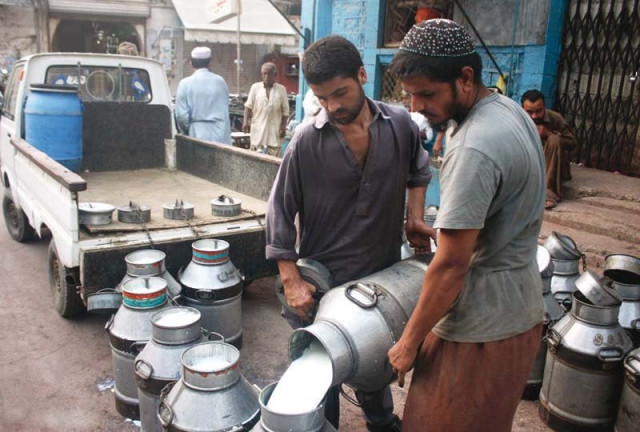Fresh milk to be sold at Rs94 per litre from April 1
SHC orders notification be issued by commissioner’s office in this regard

SHC orders notification be issued by commissioner’s office in this regard. PHOTO: ONLINE
A two-judge bench, comprising justices Aqeel Ahmed Abbasi and Ashraf Jahan, ordered that the new rates would take effect from April 1. Till then, the court ordered that the essential commodity would be sold at Rs85 per litre across the city.
The judges passed these directives while disposing of a petition filed by civil rights campaigner Muhammed Imran Shahzad, seeking reduction in prices of dairy products and the establishment of a local taskforce to regulate prices.
At the outset of Wednesday's proceedings, the judges asked the commissioner at what rate fresh milk would be available to the citizens and whether the stakeholders had reached any understanding regarding fixing its price in compliance with the court's directives issued on the last hearing.
Commissioner Ejaz Ahmed Khan informed the bench that the stakeholders, including the dairy farmers and retailers, had agreed that fresh milk would be sold at Rs94 per litre. He maintained that a notification to fix the new price at Rs94 was ready and it could be officially issued with the permission of the court.
Karachiites spend another day without milk
However, a group of the retailers objected to the price proposed by the commissioner, arguing that it was in disproportion to high production costs.
The bench asked the commissioner to explain under what law the price had been increased from Rs84 to Rs94. Khan replied that it had been fixed under the federal law.
The additional advocate-general, Shabbir Shah, confirmed that the commissioner could issue a notification under both the federal and provincial laws.
A lawyer for the dairy farmers argued that the commissioner had no legal authority to determine the price of the essential commodity after legislation was done at the provincial level.
To this, one of the judges inquired how many associations the dairy farmers and retailers had at present.
Another group of the retailers said they agreed with the commissioner’s decision.
At this, the bench members remarked that the stakeholders should realise the citizens were suffering due to the sale of the commodity at a higher rate.
"We should not ignore the poor citizens," Justice Abbasi told the officers and stakeholders.
Cattle farmers ‘milk it’ in competition
He observed that fresh milk was an essential commodity while poor people barely have anything to eat. Justice Abbasi remarked that fresh milk was a basic need not a luxury, but the stakeholders were debating whether to increase the price further.
Expressing dismay over such an attitude, the judge said that instead of selling the commodity at Rs60 or Rs70 per litre to the citizens, the stakeholders were debating an increased rate of Rs94 per litre.
In response to the stakeholders' disagreement, the bench members cautioned that the Sindh government would be directed to intervene and also provide a subsidy to the poor people who were dying of hunger.
They asked the provincial government's law officer to explain the position of the Sindh government if two laws, federal and provincial, exist in the province.
AAG Shah said the government would look into the legislation issue if the court would give it a direction in this regard.
The law officer argued that fresh milk was being sold at Rs74 per litre by the retailers when the petition was filed. He said now it had been increased to Rs94 per litre and it was being said that the court had increased the price by Rs10 per litre.
He questioned the stakeholder if there was any other commodity whose price was increased by Rs11 every year.
Livestock dept taking measures to promote buffalo farming
At this, a bench member remarked that the court was being accused of increasing the price of milk. However, the judges clarified that the court only wanted the stakeholders to mutually resolve the issue.
The provincial law officer requested time to seek instructions from the Sindh government in relation to fixing the milk price.
He told the judges that fresh milk was still being sold at exorbitant rates of Rs105 to Rs110 per litre in the markets. He sought a direction for the commissioner to take strict action against the retailers for over-charging customers.
Commissioner Khan said that the Karachi Metropolitan Corporation only had 11 inspectors and expressed his helplessness. He asked how they could effectively regulate and enforce an official rate in a city of 20 million population.
After hearing the parties, the bench ordered the commissioner to issue a fresh notification regarding the retail sale of fresh milk at Rs94 per litre. However, it ordered that the new rate would take effect from April 1.



















COMMENTS
Comments are moderated and generally will be posted if they are on-topic and not abusive.
For more information, please see our Comments FAQ